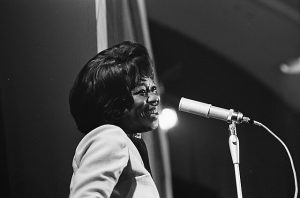Remembering Quincy Jones
March 14, 1933 – November 3, 2024
A tribute to the arranger, composer and producer
Click here to Support Jazz on the Tube
A major force in the music industry for over 70 years, Quincy Delight Jones passed away on Nov. 3, 2024 at the age of 91.
He was born in Chicago on Mar. 14, 1933, took up the trumpet when he was young, and grew up in Seattle.
As a teenager, Jones was friends with Ray Charles (who was two years older) and they often played together in the early days.
He studied at Seattle University for one semester in 1951 before transferring to the future Berklee College Of Music.
When he was 20, Jones joined the Lionel Hampton Orchestra as a trumpeter (soon sitting next to Clifford Brown and Art Farmer) and wrote some of his first arrangements.
Back in New York, he freelanced, worked on the Dorsey Brothers’ Stage Show in 1956, and then joined the globetrotting Dizzy Gillespie Orchestra as an arranger and trumpeter.
Jones was soon recording with his own band, he wrote arrangements for Dinah Washington, spent time in Paris studying composition and theory with Nadia Boulanger, and became music director for the Barclay label.
Quincy Jones led his short-lived big band during 1959-61 which struggled during a European tour and soon broke up; among his sidemen were Clark Terry, Phil Woods, and Budd Johnson.
Jones became the vice-president of the Mercury label in 1961, wrote arrangements for Count Basie and a variety of singers (including Frank Sinatra, Sarah Vaughan, Ella Fitzgerald, and Peggy Lee), and composed film scores for over 35 movies (including The Pawnbroker) and for television shows while also producing many albums for others.
After making such colorful recordings as Walking In Space (1969), Gula Matari (1970), and Smackwater Jack (1971), Quincy Jones mostly left jazz to work on pop music including producing Michael Jackson records (including Thriller) and the soundtrack to the Wiz.
His later jazz work mostly involved helping the careers of young artists, convincing Miles Davis to revisit some of Gil Evans’ arrangements at the 1991 Montreux Jazz Festival, splitting the writing duties with Sammy Nistico on the 1990 album Basie & Beyond, reviving some of his older charts, and reminiscing happily about his earlier days.
Some of Quincy Jones’ most rewarding jazz compositions were “Stockholm Sweetnin’,” “The Midnight Sun Will Never Set,” “For Lena and Lennie,” and “Soul Bossa Nova.”
He was a household name up until the time of his death.
Quincy Jones is seen here leading a big band around 2000 on “Soul Bossa Nova” with short solos from altoist Phil Woods and flugelhornist Clark Terry who also sings in his Mumbles style.
-Scott Yanow


